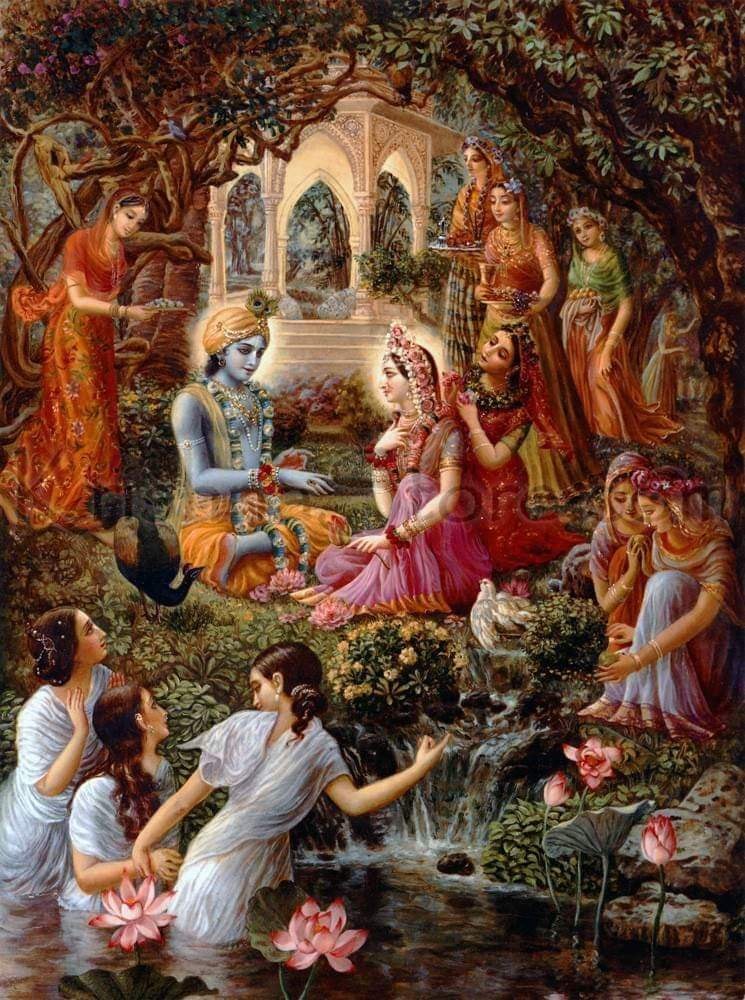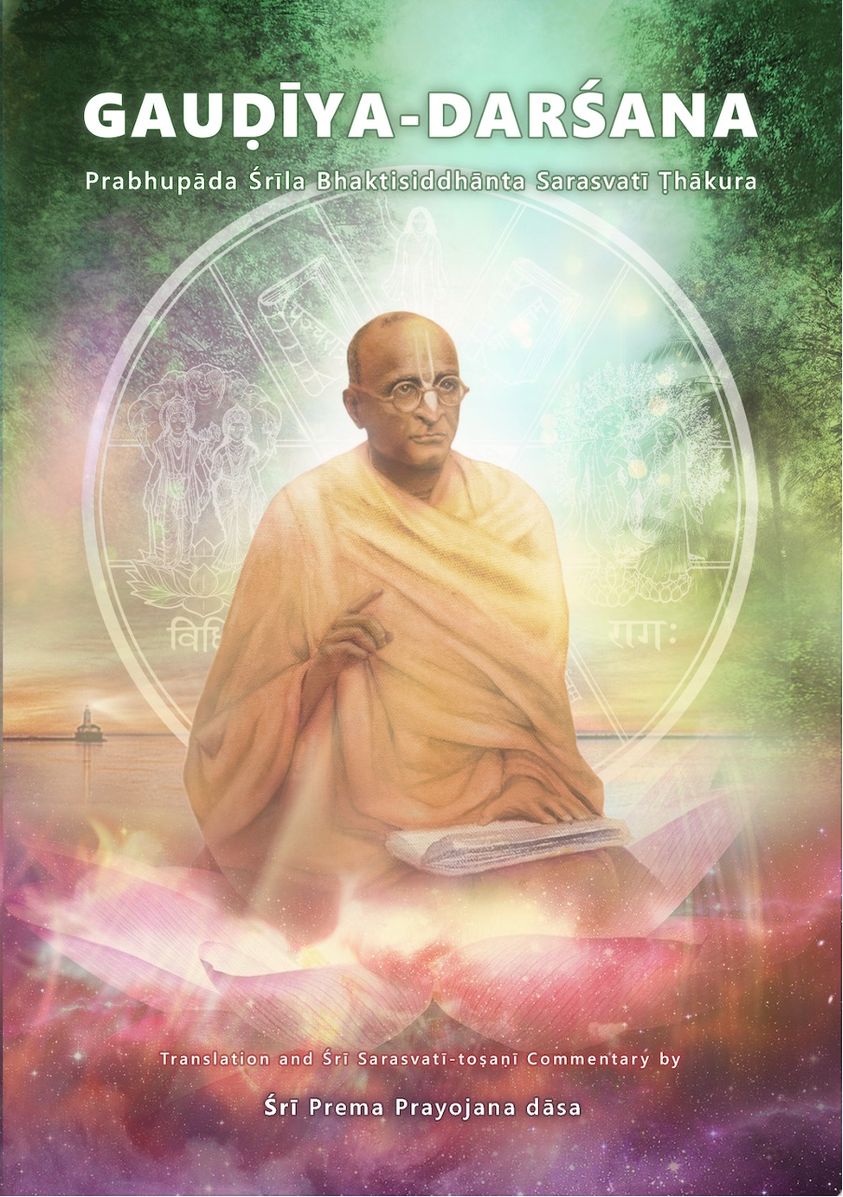THE JAIVA DHARMA
The following is a short excerpt from Srila Bhaktivinodha Thakuras famous book Jaiva Dharma Chapter 16.
The book was translated from Bengali into Hindi by Srila Bhaktivedanta Narayana Maharaja and then into English by his disciples./
Please find several further resource links about this remarkable book at the end of the article.
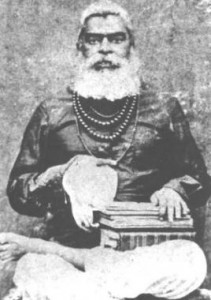
Srila Bhaktivinoda Thakura
Vrajanatha said:
“Please explain to me, if the jiva is a pure spiritual entity, how did he become entangled in this miserable world?”
Babaji smiled and said :
svaruparthair hinan nija-sukha-paran krishna-vimukhan
harer maya-dandyan guna-nigada-jalaih kalayati
tatha sthulair lingai dvi-vidhavaranaih klesa-nikarair
mahakarmalanair nayati patitan svarga-nirayau
Dasa-mula, Sloka (6)
By his original nature the jiva is an eternal servant of Krishna. His svarupa-dharma is service to Sri Krishna. Bhagavan’s bewildering energy (maya) punishes those jivas who are bereft of that svarupa-dharma. These jivas are diverted from Krishna, and are concerned with their own happiness. She binds them in the ropes of the three modes of material nature – sattva, rajah and tamah – covers their svarupa with
gross and subtle bodies, thows them into the miserable bondage of karma, thus repeatedly causing them to experience happiness and distress in heaven and hell.
Innumerable jivas appear from Sri Baladeva Prabhu to serve Vrindavana-vihari Sri Krishna as His eternal associates in Goloka Vrindavana, and others appear from Sri Sankarshana to serve the Lord of Vaikuntha, Sri Narayana, in the spiritual sky. Eternally relishing rasa, engaged in the service of their worshipable Lord, they always remain fixed in their constitutional position. They always strive to please Bhagavan, and are always attentive to Him. Having attained the strength of cit-sakti, they are always strong.
They have no connection with the material energy. In fact, they do not know if there is a bewildering energy called maya or not. Since they reside in the spiritual world, maya is very far away fromthem and does not affect them at all. Always absorbed in the bliss of serving their worshipable Lord, they are eternally liberated and are free from material happiness and distress. Their life is love alone, and they are not even conscious of misery, death or fear.
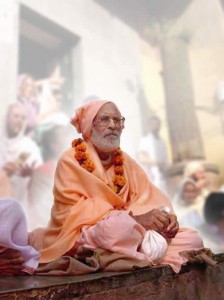
Srila Bhaktivedanta Narayana Maharaja
“There are also innumerable, atomic, conscious jivas who emanate as rays in Karanodakasayi Maha-Vishnu’s glance upon His maya sakti. Since these jivas are situated next to maya, they perceive her wonderful workings. Although they have all the qualities of the jivas that I have already described, because of their minute and marginal nature, they sometimes look to the spiritual world, and sometimes to the material world. In this marginal condition, the jiva is very weak because at that time he has not attained spiritual strength from the mercy of the object of his worship (seva-vastu).
Among these unlimited jivas, those who want to enjoy maya become engrossed in mundane sense gratification and enter the state of nitya-baddha. On the other hand, the jivas who perform cid anusilanam of Bhagavan receive spiritual sakti (cid-bala) by His mercy, and enter the spiritual world. Baba! It is our great misfortune that we have forgotten our service to Sri Krishna, and have become bound in the shackles of maya. Only because we have forgotten our constitutional position, are we in this deplorable condition.”
Vrajanatha: Prabhu, I understand that this marginal position is situated in tatastha-svabhava, or junction, of the spiritual and material worlds. Why is it that some jivas go from there to the material world, while others go to the spiritual world?
Babaji: Krishna’s qualities are also present in the jivas, but only in a minute quantity. Krishna is supremely independent, so the desire to be independent is eternally present in the jivas as well. When the jiva uses his independence correctly, he remains disposed towards Krishna, but when he misuses it, he becomes vimukha (indifferent) to Him. It is just this indifference that gives rise to the desire in the jiva’s heart to enjoy maya. Because of the desire to enjoy maya, he develops the false ego that he can enjoy material sense gratification, and then the five types of ignorance
- tamah (not knowinganything about the spirit soul)
- moha (the illusion of the bodily concept of life),
- maha-moha (madness for material enjoyment)
- tamisra (forgetfulness of one’s constitutional position due to anger or envy and and
- hatamisra (considering death to be the ultimate end) cover his pure, atomic nature.
Our liberation or subjugation simply depends on whether we use our minute independence properly, or misuse it.
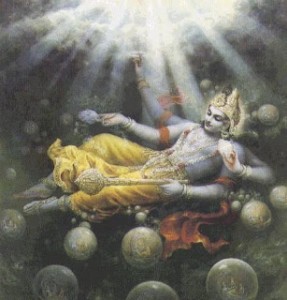
God is all powerful He is never subject
to material short comings
Vrajanatha: Krishna is karunamaya (full of mercy), so why did He make the jiva so weak that he became entangled in maya?
Babaji: It is true that Krishna is karunamaya, overflowing with mercy, however, He is also lilamaya, overflowing with desire to perform pastimes. Desiring various pastimes to be enacted in different situations, Sri Krishna made the jiva’s eligable for all conditions, from the marginal state to the highest state of mahabhava. And to facilitate the jiva’s progressing practically and steadfastly towards becoming qualified for Krishna’s service, He has also created the lower levels of material existence, beginning from the lowest inert matter up to ahankara, which are the cause of unlimited obstruction in attaining paramananda. Having fallen from their constitutional position, the jivas who are entangled in maya are indifferent to Krishna and engrossed in personal sense gratification.
However, Sri Krishna is the reservoir of mercy. The more the jiva becomes fallen, the more Krishna provides him with opportunities to attain the highest spiritual perfection. He brings this about by appearing before him along with His spiritual dhama and His eternal associates. Those jivas who take advantage of this merciful opportunity and sincerely endeavor to attain the higher positiongradually reach the spiritual world and attain a state similar to that of Sri Hari’s eternal associates.
Vrajanatha: Why must the jivas suffer for the sake of Bhagavan’s pastimes?
Babaji: The jivas possess some independence. This is actually a sign of Bhagavan’s special mercy upon them. Inert objects are very insignificant and worthless because they have no such independent desire. The jiva has attained sovereignty of the inert world only because of his independent desire. Misery and happiness are conditions of the mind. Thus what we may consider misery is happiness for one engrossed in it. Since
all varieties of material sense gratification finally result in nothing but misery, a materialistic person only achieves suffering.
When that suffering becomes excessive, it gives rise to a search for happiness. From that desire, discrimination arises, and from discrimination, the tendency for inquiry is born. As a result of this, one attains sat-sanga (the association of saintly people), where upon sraddha develops. When sraddha is born, the jiva ascends to
a higher stage, namely the path of bhakti.
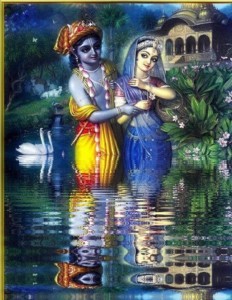
Radha and Krishna
Gold is purified by heating and hammering. Being indifferent to Krishna, the jiva has become impure through engaging in mundane sense gratification. Therefore, he must be purified by being beaten with the hammers of misery on the anvil of this material world. By this process, the misery of the jivas averse to Krishna finally culminates in happiness. Suffering is therefore just a sign of Bhagavan’s mercy. That is why far sighted people see the suffering of jivas in Krishna’s pastimes as auspicious, though the near sighted can only see it as an inauspicious source of misery.
Vrajanatha: The jiva’s suffering in his conditioned state is ultimately auspicious, but in the present state it is very painful. Since Krishna is omnipotent, couldn’t He think of a less troublesome path?
Babaji: Krishna’s lila is extremely wonderful and of many varieties; this is also one of them. If Bhagavan is independent and almighty, and performs all kinds of pastimes, why should this be the only pastime that He neglects? No pastime can be rejected if there is to be full variety. Besides, the participants in other types of pastimes also must accept some sort of suffering. Sri Krishna is the enjoyer (purusha) and the active agent (karta). All ingredients and paraphernalia are controlled by His desire and subject to His activities.
It is natural to experience some suffering when one is controlled by the desire of the agent. However, if that suffering brings pleasure in the end, it is not true suffering. How can you call it suffering? The so-called suffering that one undergoes in order to nourish and support Krishna’s pastimes is actually a source of delight. The jiva’s independent desire has caused him to abandon the pleasure of serving Krishna, and instead accept suffering in maya. This is the jiva’s fault, not Krishna’s.
Vrajanatha: What harm would there have been if the jiva had not been given independent desire? Krishna is omniscient, and He gave this independence to the jivas, even though He knew that they would suffer on account of it, so isn’t He responsible for the jiva’s suffering?
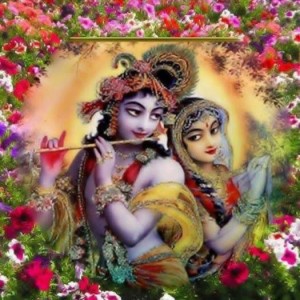
Radha and Krishna The Absolute Truth
Babaji: Independence is a precious jewel, in the absence of which inert objects are insignificant and worthless. If the jiva had not received independence, he would also have become as insignificant and worthless as the material objects. The jiva is an atomic, spiritual entity, so he must certainly have all the qualities of spiritual objects. The only difference is that Bhagavan, who is the complete spiritual object, possesses all these qualities in full, whereas the jiva only has them to a very minute degree. Independence is a distinctive quality of the spiritual object, and an object’s inherent quality cannot be separated from the object itself. Conse-
quently, the jiva also has this quality of independence, but only to a very minute degree, because he is atomic. It is only because of this independence that the jiva is the supreme object in the material world, and the lord of creation.
The independent jiva is a beloved servant of Krishna, and thus Krishna is kind and compassionate towards him. Seeing the misfortune of the jiva, as he misuses his independence and becomes attached to maya, He chases after him, weeping and weeping, and appears in the material world to deliver him. Sri Krishna, the ocean of compassion, His heart melting with mercy for the jivas, manifests His acintya-lila in the material world, thinking that His appearance will enable the jiva to see His nectarean pastimes. However, the jiva does not understand the truth about Krishna’s pastimes, even after being showered by so much mercy, so Krishna then descends in Sri Navadvipa in the form of guru. He personally describes the supreme process of chanting His name, form, qualities and pastimes, and personally instructs and inspires the jivas to take to this path by practicing it Himself. Baba, how can you accuse Krishna of being at fault in any way when He is so merciful? His mercy is unlimited, but our misfortune is lamentable.
Vrajanatha: Is maya-sakti the cause of our misfortune then? Would the jivas have had to suffer like this if the omnipotent and omniscient Sri Krishna had kept maya away from them?
Babaji: Maya is a reflected transformation of Krishna’s internal potency, svarupa-sakti, and it is like a fiery furnace where the jivas who are not qualified for Krishna’s seva are chastized and made fit for the spiritual world. Maya is Krishna’s maidservant. In order to purify the jivas who have turned against Krishna, she punishes them, gives appropriate therapy, and purifies them. The infinitesimal jiva has forgotten that he is an eternal servant of Krishna, and for this offense, maya, taking the form of a witch (pisaci), punishes him.
This material world is like a jail, and maya is the jailer who imprisons the estranged jivas and punishes them. A king constructs a prison for the benefit of his subjects, and in the same way, Bhagavan has shown His immense mercy towards the jivas by making this prison-like material world and appointing maya as its custodian.
Vrajanatha: If this material world is a prison, it also requires some suitable shackles. What are they?
Babaji: Maya incarcerates the offensive jivas with three types of shackles: those made of
- goodness (sattva-guna), those made of
- passion (rajo-guna), and those made of
- ignorance (tamo-guna).
These fetters bind the jiva, whether his inclination is tamasika, rajasika, or even sattvika. Shackles may be made of different metals such as gold, silver or iron – but that makes no difference to the pain of being bound by them.
Vrajanatha: How can the shackles of maya bind the atomic, conscious jivas?
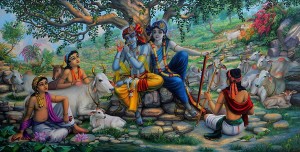
Those who understand this knowledge and take to
Bhakti Yoga go back home
Babaji: Objects of this material world cannot touch spiritual objects. However, as soon as the jiva develops the conception that he is an enjoyer of maya, his atomic, spiritual form is covered by the subtle body made of false ego. That is how the shackles of maya bind his legs. The jivas having a sattvika ego reside in the higher planets and are called devatas; their legs are bound by sattvika shackles made of gold. The rajasika-jivas have a mixture of the propensities of the devatas and of the human beings, and they are confined in rajasika shackles made of silver.
And the tamasika jivas, who are mad to taste jadananda (bliss derived from dull matter), are bound in tamasika iron shackles. Once the jivas are bound in these shackles, they cannot leave the prison. Even though they suffer various types of miseries, they remain in captivity.
Vrajanatha: What sort of karma (activities) do the jivas perform while confined in maya’s prison?
Babaji: Initially, the jiva performs karma to provide himself wit his desired sense pleasure, in accordance with his material propensities. Then, he performs karma (activity) to try and dispell the miseries that result from being bound by the shackles of maya.
Vrajanatha: Please explain the first type of karma in detail.
Babaji: The covering of the gross material body has six stages, namely,
Birth, Existence, Growth,Creating by-products, Decline and Death.
These six transformations are the inherent attributes of the gross body, and hunger and thirst are it’s deficiencies. The pious jiva who is situated in the material body is controlled by eating, sleeping and sensual activities, as his material sense desires dictate. In order to enjoy material comforts, he engages in a variety of activities (karma) that are born of his material desires. During the course of his lifetime, he performs ten types of purificatory ceremonies (punya samskaras), and eighteen other sacrificial rites prescribed in the Vedas.
His intention is to accumulate pious credits through these karmas, so that he can enjoy material pleasures by taking birth in a brahminical or other high-class family in this world, and thereafter, have godly pleasures in the higher planets. Thus, he undertakes the path of karma. In contrast, impious conditioned jivas take shelter of adharma, and enjoy sense gratification sacrilegiously by performing various
types of sinful activities. Jivas in the first category attain the higher planets and enjoy celestial pleasures as a result of their pious activities.
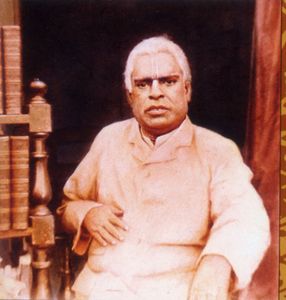
Srila Bhaktivinoda Thakura
When this period of enjoyment ends – as it must – they take birth in the material world again as human beings or in other life-forms. Jivas in the second category go to hell because of their sinful activities, and after suffering a variety of miseries there, take birth on earth again. Thus the jiva, bound in maya and entangled in the cycle of karma, wanders hither and thither seeking to enjoy sense gratification. Intermittently, he also enjoys some temporary pleasures as a result of pious activities (punya-karma), and suffers miseries because of his papa (sins).
Vrajanatha: Please describe the second type of karma as well.
Babaji: The jiva situated in the gross body undergoes immense suffering due to the deficiencies of the gross body, and he performs various types of karma in an attempt to minimize these miseries. He collects various foods and drinks to assuage his hunger and thirst, and he toils arduously to earn money, so that he can buy food easily. He collects warm clothes to protect himself from the cold, marries to satisfy his desire for sensual pleasures, and works hard to maintain his family and children and fulfill their needs.
He takes medicines to cure diseases of the gross body, fights with others, and goes to courts of law to protect his material assets. He indulges in various sinful activities – such as fighting, envious- ness, stealing, and other misdemeanors – because he is controlledby the six foes, namely, kama (lust), krodha (anger), mada (intoxication), moha (illusion), matsarya (envy) and bhaya (fear). All these activities are to alleviate his sufferings. Thus the entire life of the bewildered jiva is wasted in trying to fulfill his desires and avoid suffering.
Vrajanatha: Wouldn’t maya’s purpose have been served if she had only covered the jiva with the subtle body?
Babaji: The gross body is also necessary, because the subtle body cannot perform work. Desires develop in the subtle body because of the activities that the jiva performs in his gross body, and the jiva receives another gross body that is suitable to fulfill those desires.
The above is only a small exerpt of the Jaiva Dharma by Srila Bhaktivinoda Thakur.
Please buy the book http://bhaktistore.com/
Read Jaiva Dharma Online
Download Jaiva Dharma PDF
Read More Books From
Srila Bhaktivinoda Thakur Online
Listen To Other Lectures Based On Jaiva Dharma
http://en.wikipedia.org/wiki/Bhaktivinoda_Thakura
listen to Jaiva Dharma in audio
For any other questions please write to Devarsirat das devarsi@harekrishnasociety.com
A glimpse of Srila Gurudeva’s love for Srila Bhaktivinoda Thakur by
Bv. Tridandi Swami
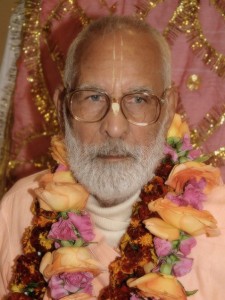
Srila Bhaktivedanta Narayana Maharaja (Gurudeva)

Bv Tridandi Swami
As we know Srila Gurudeva’s special love and affection for Srila Bhaktivinoda Thakur was prominent in so many of his public discourses and private darshans.
Gurudeva has told us many times how he learned Bengali by translating and reading Jaiva dharma more than 108 times!
Once he said in a letter, that “the reason why so many devotees are coming to me now (in the west), is simply because I read Jaiva Dharma so many times.”
When the Jaiva Dharma publication was going on in its final stages in Mathura, Gurudeva would inquire every single day for weeks about its progress and want to assist in any way at all to expedite the process.
One day Srila Gurudeva was shown the front cover layout idea of the ‘Blue’ edition. He jumped and demanded very sternly “Why have you put all these frills around Bhaktivinoda’s picture, he was such a grave and sober man?” We responded that we had tried to represent his picture as being a jewel in a locket. Gurudeva smiled, satisfied he allowed it to remain that way. But the force of his comment as to Bhaktivinoda’s gravity left a powerful impression.
When the new ‘Blue’ edition finally arrived from Delhi, Srila Gurudeva was so pleased he ordered a special midday class and called all to witness his presentation of the book to his beloved Srila Bhakti Prajnana Kesava Maharaja. He encouraged many speakers to glorify Jaiva Dharma and its powerful complete presentation of all our Gaudiya Philosophy and teachings.
We went to Srila Gurudeva once and asked him, could we take out the nama tattva section of Jaiva Dharma and present a separate publication with just these 3 chapters (23, 24, 25). Gurudeva responded.” If you have a block of gold, which part of it is more valuable?”
The subject was dropped forever.
This special disappearance festival of our beloved Srila Bhaktivinoda Thakur can be enhanced if we even touch these sacred books Jaiva Dharma, Bhajan Rahasya etc. on this day and remember the deep love and affection our beloved Srila Gurdeva held in his heart for him.
Aspiring to serve the Vaisnavas
Bv Tridandi Swami

 Posted in
Posted in 






